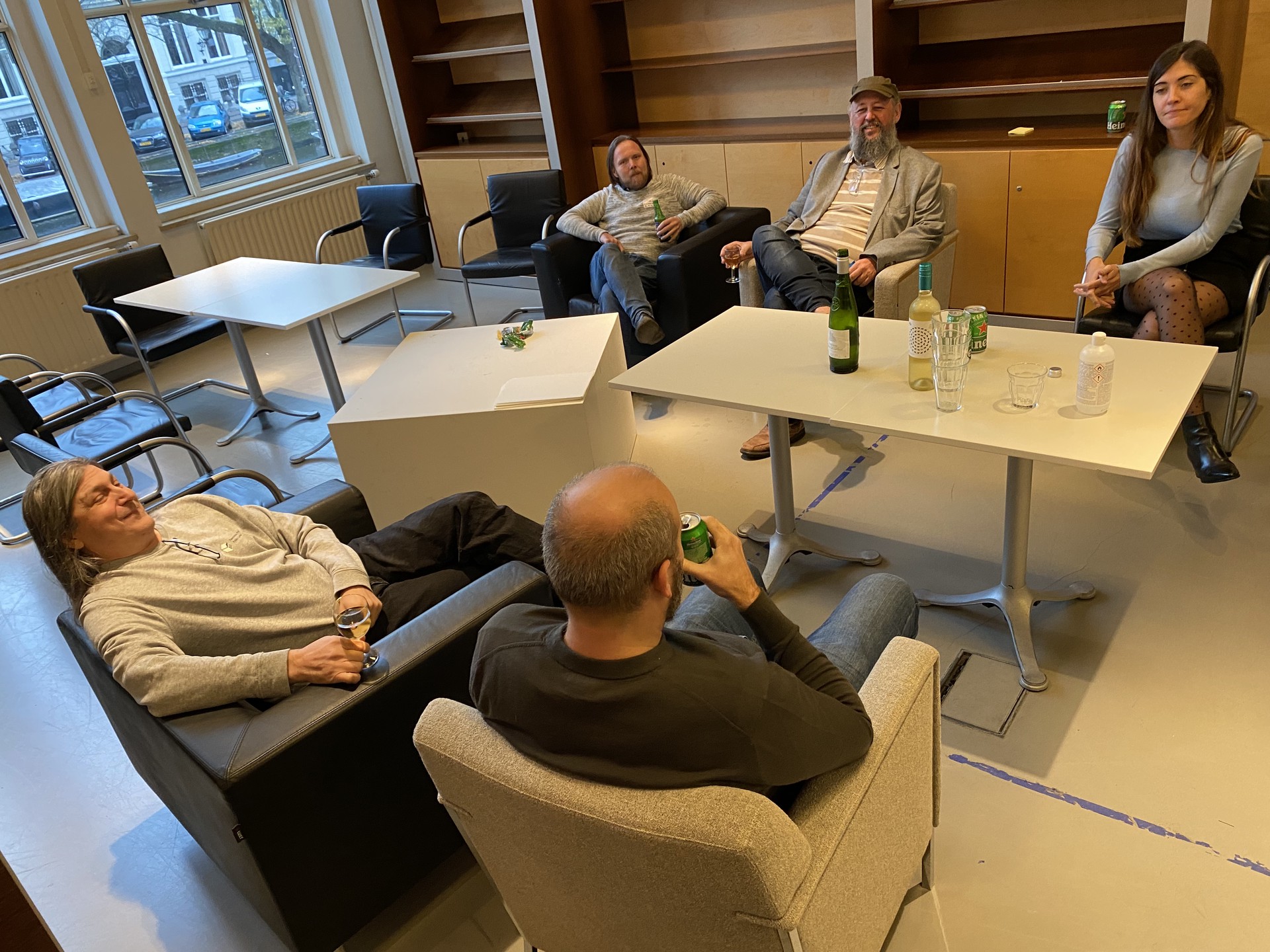Foundation for Public Code vereniging

Preface
Foreword from the President
Over the last year, our work at the Foundation for Public Code has continued to come into more resolved focus. We’ve had time to test some of our assumptions about how to best bring our mission, to enable collaborations around open public purpose software development, forward. Already, we see the seeds of our stewardship work taking root among our members and partners. But bringing groups of public administrations into alignment and collaboration takes a steady hand and plenty of time. Understanding what works to create a continuous, sustainable engagement among participating organizations, with a governance framework and technical roadmap, is a complex and subtle task. Our stewardship team continues to iterate and refine our approach and our resources on offer to members and partners.
Our primary resource, the Standard for Public Code, has seen an immense amount of attention and uptake from the community. Multiple national digital transformation departments have recognized our Standard as recommended guidance for creating codebases that easily replicate across organizations. The document itself is open and iterative, using a process that has integrated suggested edits from a far-ranging set of contributors in the community. This evolution has been gaining momentum as our community expands internationally.
Of course, the last year has also been hard on our team and our community of public organizations. The Covid lockdown changed the way we bring collaborating groups together, upended the priorities of public organizations, and took its toll on many teams’ productivity. Multiple members of our staff lost family and loved ones during the epidemic. The Foundation for Public Code greatly appreciates the efforts of those folks who have worked with us over this period, some of whom have moved on to other opportunities. We have taken the time and space necessary to process, reorient, and begin a new chapter of the organization.
As we look to the future, the Foundation for Public Code has already begun to expand its efforts into North America, bringing multiple municipalities together around public code procurement reform efforts. We have begun to participate in conversations within the European Commission and the Government Services Administration in the United States on how best to enable the adoption of public code in member states. We have understood the needs of our partner administrations to build capacity toward broader participation in codebase stewardship, and are building resources like process codebases to help provide guidance and support in these efforts. And we will soon be engaged with multiple national governments on open digital infrastructure sharing projects at an international level. The Foundation for Public Code continues to grow and evolve with our community and codebases stewarded, adopting new practices and supporting new types of partnership and collaboration toward building an ecosystem of public purpose software, process, and policy on a global scale.
Ben Cerveny,
President, Foundation for Public Code
28 June, 2022 — Amsterdam, Netherlands
Mission
“The Foundation for Public Code enables public-purpose software and policy that is open and collaborative.”
Public code is both civic code (such as policy or regulation) and computer source code (like software and algorithms) executed in a public context, by humans or machines.

Achievements in 2021
Overview: we built on our solid foundation and consolidated our learnings
2021 was a mixed year for the Foundation for Public Code. We worked with new codebases and strengthened our ties with existing codebase communities; worked with potential new codebases and philanthropic supporters; and established an advisory council. We continued to have one public member (Province of Zuid-Holland, the Netherlands), though we had hoped to secure more. We also said goodbye to some brilliant colleagues and founding board members. Against the backdrop of the ongoing COVID pandemic demanding a great deal of political attention, it sometimes felt like 2021 was a year of learning ways not to do things.
We’re looking forward to changes in 2022.
Strengthened our organization
In 2021, we focused on professionalizing our administration.
- We published our first annual report, (covering a combined 2019-2020) including developing templates with an expert financial advisor for appropriate annual financial reporting.
- We explored creating a salary framework and implementing performance management, including meeting with experts for advice. While we didn’t end up implementing these in 2021, we’d still like to do this in the future based on what we learned this year.
New expert support from the strategic council
We launched our strategic council in August. Our first council members are:
- Leslie Hawthorn, chair (Manager - Vertical Community Strategy, Red Hat Open Source Program Office)
- Gabriella Gómez-Mont (Principal at Experimentalista, former Chief Creative Officer of Mexico City)
- Dan Hill (Director of Strategic Design, Vinnova)
The strategic council is composed of individual advisors that help the Foundation for Public Code board of directors with key strategic decisions as well as serve as ambassadors for its mission.
We’re proud they’ve decided to share their special expertise with us.
Listen to Leslie and Gabriela being interviewed on our podcast Let’s talk about public code for more about their motivation and expertise.
Fundraising
In 2021, we received generous philanthropic gifts from Stewart Butterfield (CEO, Slack Technologies) and Arnout Schuijff (co-founder, Adyen). We’re forever grateful that our donors believe in our mission and our ability to make a difference.
As a public benefit organization and with the KBFUS Public Code US fund, gifts in both the Netherlands and the United States are tax deductible.
Better tools for our community and ourselves
- We published our operations handbook. Explore how we manage our finances, procurement, office, tools, staff, and staff information. When we published this, we hoped it would be a helpful resource for anyone running a similar sized NGO, either in the Netherlands or abroad, and heard back that it was!
- Building on a Wikimedia tool, we created a ticketmaster system for Jitsi Meet. This way we can offer codebase communities a video call tool that they can administer themselves that is fully open source, respects privacy and doesn’t require the contributors of the community to download and install software locally.
- In April, we opened up our Nextcloud instance to our community. They can use ONLYOFFICE to collaborate on office documents in real-time, or use it for secure file sharing. This solves specific collaboration obstacles the stewards encountered.
- We started to use the open source web analytics tool Plausible to learn how our websites are used. It’s privacy-friendly and GDPR-compliant. For increased transparency, the analytics are publicly available.
- We worked with our designer Ryan Conlan to add new templates and functionality to publiccode.net, and adopted a new social media management tool (Planable).
The Standard for Public Code
In 2021, the Standard continued to prove its value to public code communities. Developers from three codebases worked with Foundation for Public Code stewards to evaluate their codebases with the Standard. Additionally, the stewards discussed the self evaluations performed by developers of two other codebases. Responding to community requests, we established a process for unofficial community translations of the Standard into other languages. It is already translated into Spanish.
In July, the Standard for Public Code was recognized as a Digital Public Goods by the Digital Public Goods Alliance, a multi-stakeholder initiative endorsed by the United Nations Secretary-General’s Roadmap for Digital Cooperation.
8 contributors made improvements, leading to 2 new versions being released during the year.
Our monthly Standard community calls attracted 15 participants. From May, we also developed the practice of monthly public standard backlog pruning, to ensure the Standard continues to evolve and become more helpful.
Members and partners
Our membership stayed steady this year. Provincie Zuid-Holland (the Netherlands) remained a member.
Our membership development team spoke with a wide range of entities, including:
- countries
- provinces
- counties
- cities and municipalities
- associations of municipalities
As set out in our annual report 2019-2020 and after years of being told by interested public organizations that Foundation membership is not currently an option for them, we introduced the concept of Foundation for Public Code partners - public organizations we collaborate with on public code projects who are not members. Though no partnerships were established by the end of 2021, we received positive feedback from public organizations.
In October, we started working with Matthew Claudel to explore open source software opportunities in North America.
Codebase stewardship
In 2021, we had 2 codebases in Incubation (Signalen and OpenZaak) and one in Assessment (Digital Omgevingsbeleid). We also worked closely with Demodam.
Signalen
- In February, the Signalen codebase started incubation with the Foundation for Public Code.
- Signalen had its first replicators in 2021. Starting with ‘s-Hertogenbosch, there were 3 by the end of the year.
- Signalen hosted their 2nd community day in March, attracting over 55 potential replicators and vendors.
- There’s increasing international interest in Signalen - Ghent (Belgium) joined the community day, and Helsingborg (Sweden) tested a demo version.
- Signalen moved closer to Standard for Public Code compliance by fully meeting the criteria Publish with an open license.
Digital Omgevingsbeleid
- The codebase stewards and Digital Omgevingsbeleid team designed and ran workshops on essential skills for open technical and product management of a public codebase.
- Improving towards meeting more of the Standard for Public Code criteria, the Omgevingsbeleid developers began creating automated tests suites for the codebases and measuring code coverage.
OpenZaak
- The OpenZaak community consolidated healthy community practices. They established a process for vulnerability reporting and set up a mailing list for upcoming early release notices.
- OpenZaak moved closer to Standard for Public Code compliance by fully meeting the criteria Make contributing easy, Use open standards and Document codebase maturity.
Over the course of the year, the codebase stewards also met with additional codebases to explore codebase stewardship.
Ecosystem
In 2021, we were an active member of our broader ecosystem, contributing our time and resources to strengthen our community. We spoke at 18 events and conferences for our broader community - some of our talks and slides were recorded. We mentored at and helped organize 2 hackathons.
In June, we were proud to be a founding member of the OSPO Alliance, a new coalition to help organizations discover and understand open source.
We launched a free online course introducing the Standard for Public Code, hosted by Open and Agile Smart Cities’ CITYxCITY online learning platform.
We held 20 community calls in 2021, covering the Standard for Public Code and the Foundation for Public Code’s work. We also started pruning the backlog of issues for the Standard for Public Code in the open in the spring (May).

About Us
Outreach and communications
We engaged with our community in a variety of ways:
- Ben contributed to the new California Technology Strategic Plan - Vision 2023.
- People wrote about us 8 times.
- During the year we released 7 episodes of our podcast Let’s talk about public code.
- We authored 4 guest blogposts on other platforms, and were interviewed on 1 podcast.
- We tried new approaches: we held a Twitter spaces talk, and a storytelling workshop.
 This was the only photo of staff together in person we could find for 2021: after work drinks at the office, with (clockwise from left) Eric, Jan, Ben, Alba and Felix. Photo by Kehinde.
This was the only photo of staff together in person we could find for 2021: after work drinks at the office, with (clockwise from left) Eric, Jan, Ben, Alba and Felix. Photo by Kehinde.
Our People
In 2021, the core of our team stayed the same:
- Boris van Hoytema (Chief Executive, co-founder)
- Ben Cerveny (President, co-founder)
- Elena Findley-de Regt (Communications Coordinator)
- Claus Mullie (Codebase Stewardship Coordinator)
- Eric Herman (Lead Codebase Steward for Quality)
- Jan Ainali (Codebase Steward for Community)
These sorely missed team members left for new positions between October and December 2021:
- Deborah Meibergen (Operations Coordinator)
- Felix Faassen (Codebase Steward for Product)
- Alba Roza (Codebase Steward for Community)
- Laura Scheske (Membership Developer)
Kehinde Bademosi joined us in August as our new storyteller and communications editor. Matthew Claudel is helping us explore new needs and develop new communities of practice in the US and Canada.
Floris Deerenberg and Ryan Conlan continued to provide ad hoc illustration, design and communication support. Rob Schouten provided financial expertise together with our bookkeepers from Get Monkeys. We switched bookkeepers to GoedOpOrde.nl the fall of 2021.
Our board of directors
- Ben Cerveny (Chairman)
- Boris van Hoytema (Secretary)
- Arnout Schuijff (Treasurer) (until March 2021)
- Eric Herman (Treasurer) (from July 2021)
- Pieter van der Does (until March 2021)
Board members do not receive any compensation, and did not incur any expenses for their activities.
We’re enormously grateful to Arnout and Pieter for their support and hard work over the years. We expect to recruit new board members in 2022.

Our Finances
This section provides an overview of the detailed financial report that accompanies this annual report.
See the full financial report.
In 2021, the organization continued to depend on philanthropic donations. It has been the aim of the Foundation to eventually be self-supporting through the contributions of public organizations.
To prevent undue influence, all donations are un-earmarked and go into our general operating budget, in compliance with our status as a Dutch public benefit organization (ANBI).
We try to look two years ahead with our financial planning. The organization has low financial risk: it is not capital intensive (no large capital expenditures) and has no loans with regard to the organization’s assets.
The current financial situation gives the Foundation for Public Code financial security until June 2023.
As in previous years, our largest cost (and our biggest investment) is the amazing people who make our work possible. This includes their salaries, wage taxes, insurances and expenses.
Our other costs:
- Office and admin (VoIP telephony, insurance, tools, furniture for working from home, equipment and subscriptions to enable our staff to do their best work)
- Project and community costs (events, community tools, travel for conferences and meetings with the community, design, marketing and market research)
- Fundraising and membership development
Financial details
Total costs in 2021 were €838,451.
| Costs | 2021 |
|---|---|
| People | 595,440 |
| Office & Admin | 41,266 |
| Project & Community | 90,494 |
| Fundraising | 106,480 |
| Other expenses | 4,771 |
| Total | €838,451 |
Total income in 2021 was €698,580.
| Income | 2021 |
|---|---|
| Contribution members | 0 |
| US Gifts | 257,080 |
| (Fiscal based) gifts | 441,500 |
| Total | 698,580 |
Our financial model for the coming years
In the future, we aim to be primarily publicly-funded, with additional philanthropic support. The financial sustainability of our organization should be secured by public funds and membership dues, with philanthropic gifts used for additional activities such as awareness raising and ecosystem growth. We recognized in 2021 that becoming primarily member-funded was unlikely.
Impact of the Covid-19 crisis and our continuity
We continued to work remotely in 2021. As in 2020, we were not able to meet with public organizations or attend events abroad. In our 2019-20 annual report, we said that “Due to the composition of our income stream, we do not expect a negative impact of the Covid-19 crisis on our operations in the short term.” By 2021, it was clear that managing COVID-19 absorbed significant political resources and attention; we found many public organizations did not have the bandwidth to embark on non-essential new initiatives.
